Uncensored Thoughts on Product Management, [Fin]Tech Markets, and VC as I Look for my Next Adventure
After nearly two fantastic years, I'm finishing up with Costanoa Ventures. I'm compelled to share some thoughts as I ramp up my search for what's next.
I've generally believed and advised that your tech career should be about accumulating experiences and relationships. That is not financial advice! The lucrative path for most tech workers is to vest as many of those sweet RSUs as possible at bigco over a bull run like we just had. Most people who made a lot of money over the last 10 years did just this. That said, I followed my own advice by chasing intellectual curiosities. It led me to venture capital for 2 years after almost 13 years in product management.
Through the rest of this post, I share my uncensored thoughts on aspects of the industry, personal details about my journey, and what I'm looking for next.
Warning: Expect a rare level of vulnerability and authenticity, with a sprinkle of controversial opinions and unconventional views. If you're intrigued, I'm always up for a deeper conversation so feel free to reach out, even if you disagree.
Looking back to look forward
A quick look back brings a smile and a sigh.
Sometimes, I feel like I'm the only person who worked through the entire last cycle without getting filthy wealthy. I recognize this is relative, and I'll sound tone-deaf to outsiders, but the hell with it because this post lives in the tech echo chamber. I'm really only sharing this to express how hungry I still am, and to let all the others out there in a similar position know they aren't alone. There are plenty of competent, ambitious, good humans who just didn't end up at the right places at the right times, or who took some swings instead of playing it safe, and lost (financially).
It wasn't for a lack of working hard or taking risks. Often these things come down to luck and timing. I've seen greatness. I've also seen the opposite.
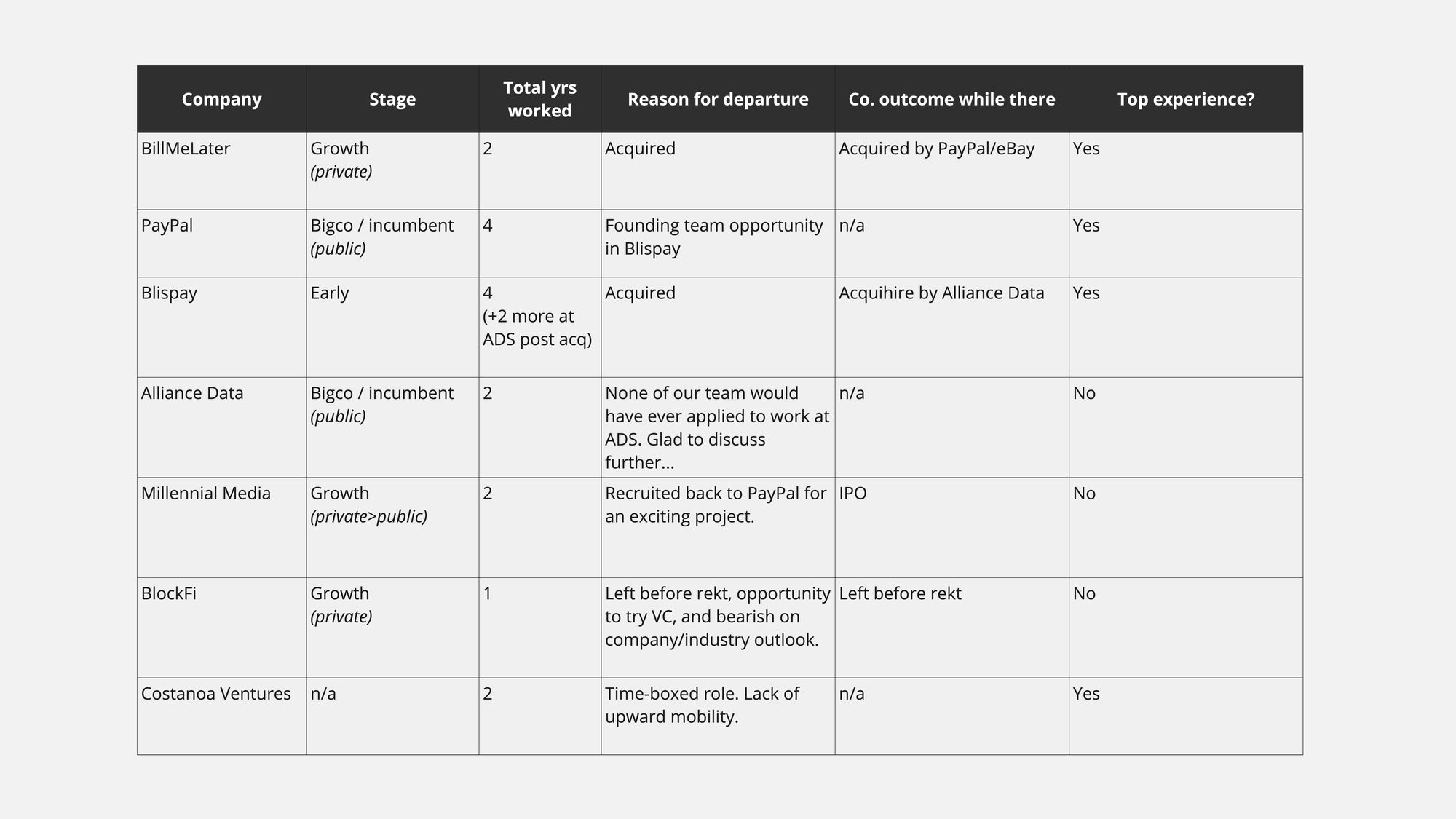
I've worked at 6 companies and 1 venture capital firm since 2007, accumulating a wide range of experiences, from working at 0-to-1 startups to publicly traded companies. I've also worked on a variety of functions. Company stage and size doesn't decide my level of happiness.
My favorite experiences stretched across all stages:
- Blispay: I was on the founding team. True 0 to 1 journey. My work had a heavy emphasis on product but I was also the 'do-a-little-bit-of-everything' employee every new startup has.
- BillMeLater: This was a mature, growth stage company, firing on all cylinders. Very innovative. High density of talent. (highly recommend hearing some of the story).
- PayPal: Big, iconic company. I think it's special to work on products that tens of millions of people use. Something I helped lead the build of 10 years ago is still used today, which can't be said by most people in tech.
- Costanoa: Early-stage venture investing. Super intellectually stimulating.
Here's a hard truth for any of you folks looking at joining startups (of any stage) for financial upside – I've made more money from crypto and stock investing than I've ever made from startup equity. And I gave up more money in unvested bigco RSUs as a low-mid level PM than I ever made investing. The big swing I took in joining the founding team of Blispay was an incredible experience but abruptly ended in heartbreak after 4 years, accounting for the bulk of my late 20s.
There's a silver lining for me and my lucky future employers: I'm ready to go.
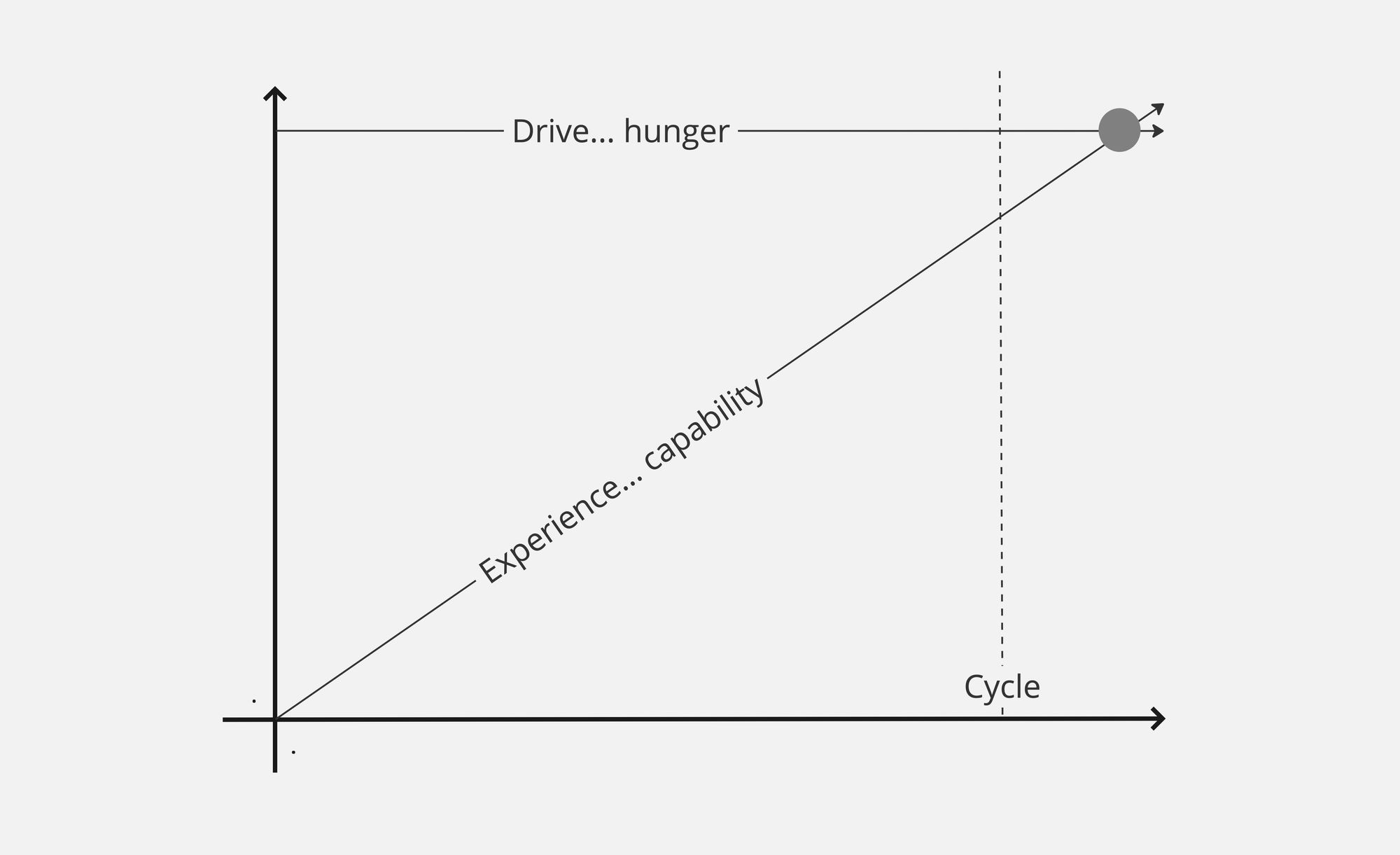
My professional graph uniquely intersects where drive meets capability for the first time in my career, just in time for a new cycle. Few can claim this broad spectrum of experience.
I've worked at every stage company, including on the founding team, at incumbents, and in venture capital. I've built products and apps from 0 to 1, inherited hot balls of shit from those before me to improve and scale during hyper growth, sunset products, rebranded, recruited, advise founders and mentor younger PMs, have experience standing up processes and teams for functions like account management and sales, creatively discovered the top inbound lead source for a company, been that connective tissue between all functions in an org, have analyzed hundreds of startups, financial projections, and gone deep in various markets.
I've been through an acquihire, a $1b acquisition, an IPO, and have led multiple seed rounds.
And I'm still amped to go do the best work of my career.
Most folks with this much range are either satiated, lazy, or exhausted. But not me. I feel like I've been training my entire life for this.
On the Market & Product Management
Given I'm entering the market for the first time in a few years, it's worth highlighting the current state, as well my thoughts on the evolution of product management. Although I may not stay strictly in product going forward, I'll always have a soft spot and keen interest in it given my background.
It's a shitty job market (on both the venture and company sides). Though some companies might be in a healthier position now, an imbalance between supply and demand for knowledge workers persists. Layoffs have slowed but many companies still aren't growing headcount. Furthermore, we're set to see a mass extinction of early-stage startups in the coming 6-18 months, flooding the market with even more job seekers.
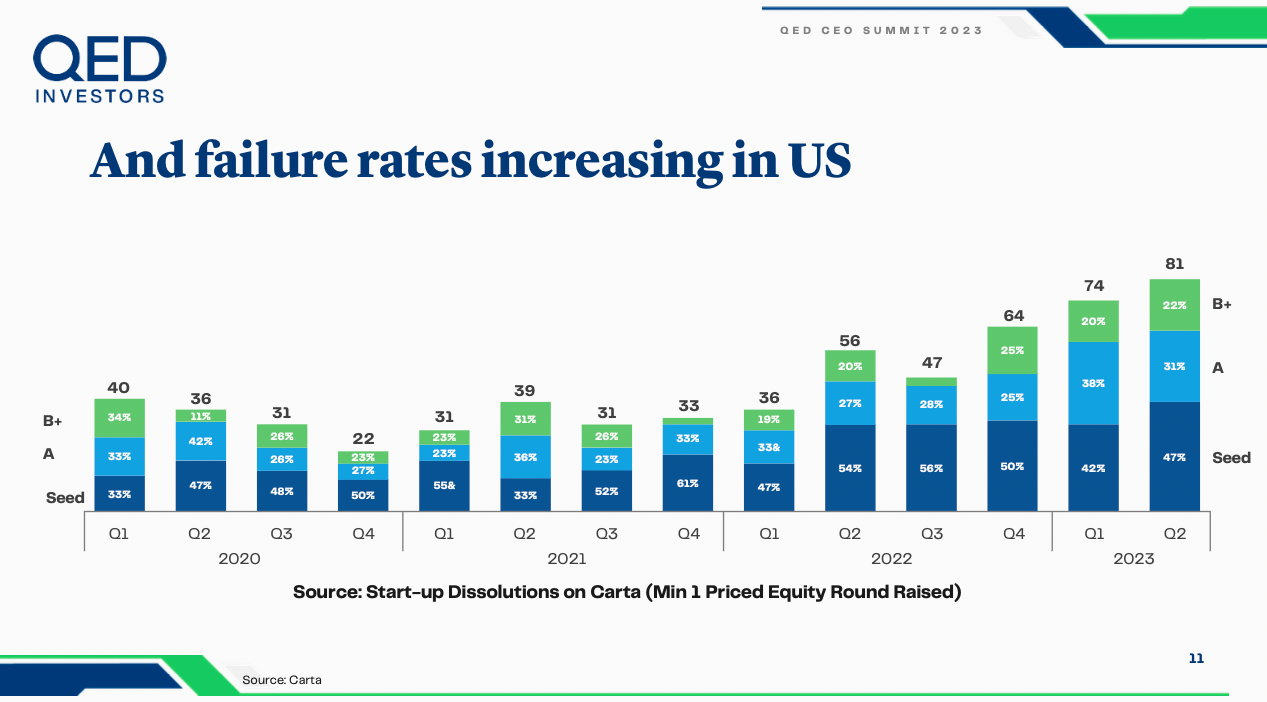

Product management isn't immune. Aakash quantified the imbalance in today's PM job market in this post. "While the supply situation isn’t quite as bad as it was for most of the year, it’s still not great. And the demand situation is plain bad for candidates. As a result, this is still one of the toughest PM job markets in recent history."
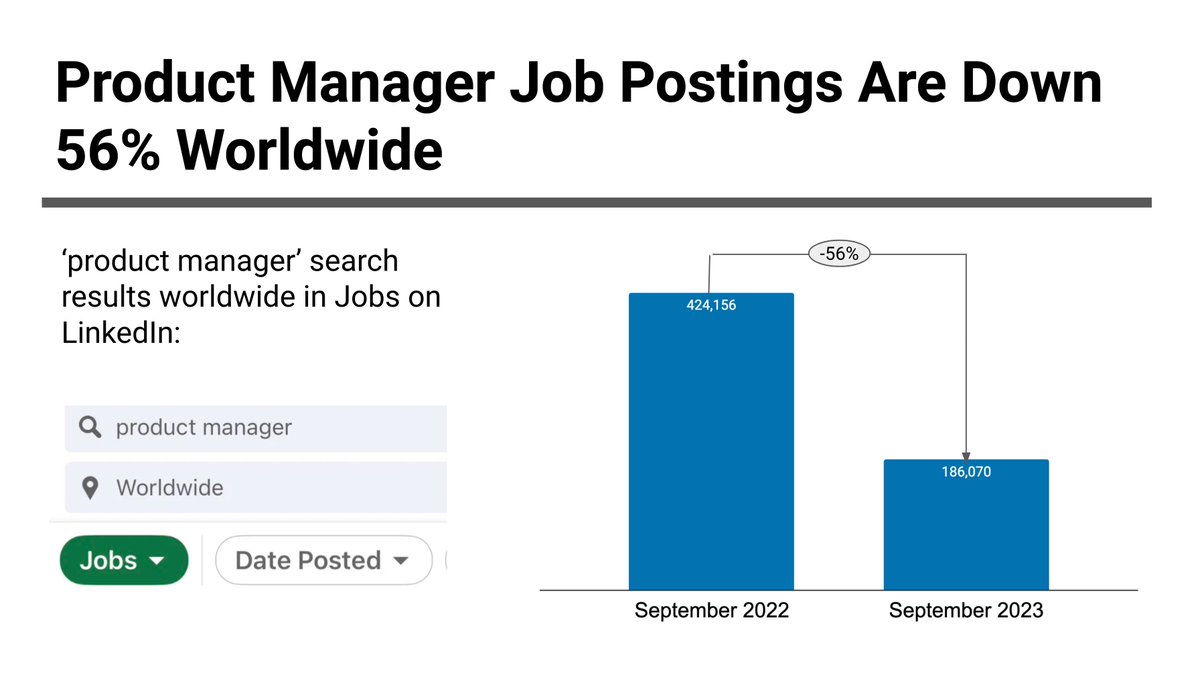
I feel for everyone who has been on the market for a long time. Cycles. This is just how it goes sometimes. Remember, neither good nor bad phases last indefinitely. Find a way to keep your brain sharp, cut expenses, stay positive, and get creative. Feel free to reach out if I can help you somehow.
The purpose of PM – reliably getting shit done
The discourse around product management is dynamic. Some people are going as far as saying product managers shouldn't exist. I disagree with that. But I agree it needs to be improved at a lot of companies. I appreciate recent, public commentary from people like Claire Vo, Maia Bittner, and even Matt Janiga.




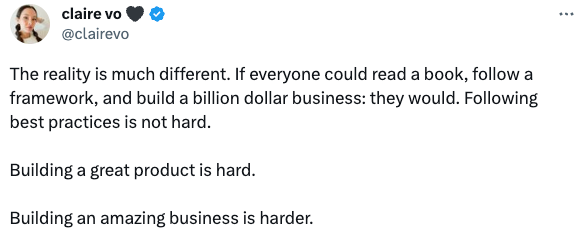
Classic PM literature, from "Inspired" to "Good PM vs. Bad PM," played a monumental role in shaping many of our perceptions. They probably played a role in readers falling into the trap of starving for perfect process and product cultures, which often led towards frustration. However, with experience, it's evident that some of these teachings can be reductive. A new generation of voices like Aakash Gupta, Shreyas Doshi, Lenny Rachitsky, and Claire Vo are ushering in pragmatic approaches over traditional dogmas.
Behemoths like Google have deeply influenced much of the VC-backed tech landscape, including some of growth-stage fintech, and I don't think it's all been positive. While they've birthed some of the industry's most influential operators, they've also evolved into assembly lines. Many of their PMs specialize in specific niches around growth or engagement in an environment utterly reliant on in-house custom infrastructure. And they only know a world in which they have extreme market pull and engaged user bases. Outside these behemoths, the reality is often starkly different, where you have to heavily partner and leverage third-parties and navigate non-proprietary infrastructure. This demands adaptability, especially in fintech. Those shielded by ad-supported business models can find their methodologies lacking efficacy when applied to more dynamic ecosystems.
Their influence has permeated hiring processes elsewhere, driving a homogenization in interview styles and creating an almost industrial approach to recruiting. As a result, an entire industry has propped up around this style of interviews. I have nothing against companies like Exponent since they help candidates land jobs. But I have something against the fact that you can pay a few grand, conduct 20, 50, 100+ mock interviews over a few months, and often score much higher on the hiring and pay scale than a candidate who spent that same time doing real, relevant product work.

At the end of the day, companies hire you to deliver, period, by any means necessary more times than not. No matter your role, be a force multiplier for progress and momentum. When people asked me about my superpower as a PM IC, I answered, "the ability to constantly, reliably get shit done in complex environments." That's what should be expected of most PMs. Reliability implies one is responsible, creative, exercises good judgment, biased to act, and does what they need to steer one's team towards a successful outcome. I've seen a lot of PMs over the years who can't actually do that, and who complain a lot. Their day to day doesn't match the institution they originally graduated from, and feel their new employer needs to change instead of themselves. You likely can't change a company's culture, and you sure can't change their DNA. So make do with what you have, and find a way to get shit done.
On my Time in VC
While I really loved some of my operating experiences, I had some rough ones as well, including a few back to back. I then challenged myself to try venture. I was looking for a few things. I wanted to prove to myself that I could do it since I, and society, put it on such a pedestal. I wanted to see if I loved it, and determine if it's something that I think I could be great at. And quite frankly, I really wanted to try something completely new for once. I love learning and felt like it would be a great way to learn a lot of new things in a short period of time.
On Costanoa
From the outset, we knew my stint would be a time-boxed two-year program. I'm incredibly grateful to everyone at the firm. It couldn't have been a better entry into the industry. Joining felt like revisiting the zeal I felt during my initial career years. I loved every bit of it – the rapid learning, context switching, inspirational people, the thrill of the hunt, and deep work. I crave mental stimulation, so the experience was incredibly refreshing.
I had the privilege of engaging with over 400 courageous founders and played a hands-on role in guiding several startups. I also sourced and helped lead the investment process for a few opportunities we led the seed deal for – the amazing Mike Ritchie, and a yet-to-be announced cross-border payments startup.
A huge thank you to everyone at the firm, especially John Cowgill. Collaborating again in the future will be fun, albeit in a different capacity.
And to all the founders I've had the pleasure of interacting with, I hope you know how much respect and appreciation I have for what you're doing.
On venture capital
I have an atypical background with 13 years in product and ops across early-stage startups, growth stage, and incumbent bigco's. And now I've had a taste of venture.
Aside from what I wrote here, I'll share my perspective on things people ask me about most frequently, especially those who are thinking about switching to venture.
Breaking into venture is always hard. There are few openings relative to the demand, they're not usually widely advertised, and interview processes are usually long and opaque. And it's especially challenging today. Most firms aren't growing right now. Remember, firms have to raise money to invest money, and raising is harder now than in the recent past.
I think an operating background, especially in product management, can make you a better investor. In fact, I think it'll make you better than 50% right off the bat. But it certainly doesn't guarantee you'll be a great investor. Some of the best of all time didn't operate at all. What's more exciting to me is how much better of an operator I think I'll be thanks to my experience in early-stage venture. You get a crash course in strategy, fundraising, customer discovery, markets, competitive landscapes, finance, products, business models, people, and quite frankly, business. More people than ever have developed incredible product sense, but I don't think business sense has kept pace. Venture can help accelerate that development in a way that you won't get in most roles at most companies.
Something I love about the craft is the intellectual stimulation and the deep work. You get paid to meet ambitious, smart, interesting people. That includes founders but also practitioners and experts and customers. If you're a naturally curious person who craves mental stimulation, venture can be an ideal path if you land in the right role with the right firm.
Something I don't love is a lot of the people and culture. This may come as a shock to outsiders, but the industry is filled with mediocrity, relative to the prestige and height of the pedestal the job title stands on. Success for many will come down to vintage – luck and timing. Many investors lack original, independent thinking. Many spend too much of their time with other investors, are naturally risk-averse, and value status and social validation too highly. With all that said, there are many astute investors who also happen to be extraordinary human beings. But they're rarer than you'd expect. Greg Sands is one of them, someone I had never known or heard of before joining. These people exist and the world is better for it.
Ultimately, VC plays a vital role in the economy and society. It can be an incredibly enjoyable and lucrative career. Like company founders, I greatly respect those who are contrarian, differentiated, and especially those who take a risk to start their own firm, as they have to sell and fundraise just like startup founders do.
On Exploring what's Next
Proud as I am of the work I've done until now, I'm more excited about what's next. It won't just be a new job; we're entering a new cycle. And as we all know, there aren't enough great builders out there, and there's a lot more building to do, so I think I'll end up back on the operating side.
The truth is that I defy conventional labeling which makes it tough to pinpoint exactly what should come next for me. I have a range of experience and interests. Fun for me often revolves around connecting dots, systems thinking, writing, reading, and listening to podcasts like Grit with Rachel Pike and Claire Hughes Johnson, Lenny's, Fintech Takes, Leaders, Layercake, Acquired, and Business Breakdowns on my walks, evenings, and weekends. I sketch things like this on Sunday mornings after they pop in my head while showering.
I'm excited to explore a range of roles and companies:
- At early stages: early biz hire/athlete, product leadership, growth, bizops, COO.
- At later stages (including publicly traded): lead pm, group pm, special projects, gm, corp dev.
- Truly unique roles at any stage: head of fintech, special projects, strategy, chief of staff, etc.
Next steps
I'm wrapping up with Costanoa and ramping up my exploration. Given the market conditions and that it's Q4, I anticipate it taking a while to find a good fit. My goal is to land at a place that I can spend the next 5-10 years of my career, having the biggest impact yet.
If you have opportunities in mind or just want to connect, please reach out on LinkedIn, Twitter or via email at jsfranklin221 @ gmail dot com.
To close, I'll make a pitch for more optimism about the future. Incredibly meaningful companies like Square, Wise, Stripe, Shopify, and Nubank were born in the last era. I can't wait to see how they evolve and what new emerges going forward. Life and careers are fleeting. Let's make the most of them. I just came across the tweet below from 11 years ago. Thankfully it's still relevant.

Re: Risks.
I recognize the risk associated with sharing some of the content in this post (thoughts on PM, VC, and my openness to a range of career paths). But I value vulnerability and authenticity. I was inspired by a podcast episode with Rachel Pike that I recently listened to. Her atypical path includes a PhD in chemistry, venture investing, leading growth at a late stage health tech co., and then as the first employee and eventual COO of Modern Treasury. She's a badass.
Re: My Blog.
Writing is an essential part of investing, company building, and product development. I've been humbled by the recognition my blog has gained over the last 2 years. A special thanks to those who have featured my posts like Fintech Takes (here and here), TWIF (here and here), Missives (here and here), Insurtech Weekly, and Lenny's. Sorry to everyone I missed, but thank you!
For the curious, my top 10 most visited posts recently are: